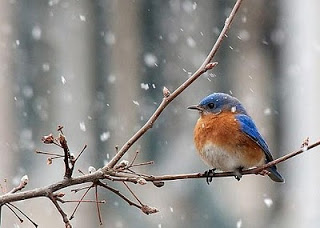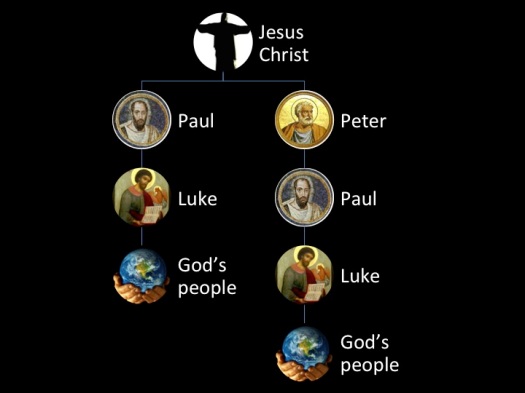The following is the sermon given this morning at St. John’s Episcopal Church, Northampton.
I’ve spent a lot of energy defending my soul against the early onslaught of Christmas in the marketplace. When I was living in a monastery, all that was taken care of for me. No decorations were allowed until December 23. No Christmas music could be played in the house. Christmas came when it was time and not a minute before.
For the past two years we have kept Advent in our home. I am still troubled by the way retail robs us of the natural transitions. We can’t even eat the turkey before the red and green explosion at Big Y. But, I am much less concerned about Christmas decorations in the streets or Christmas trees on the tops of cars before the first Advent candle is lit.
Advent is really not about holding off Christmas – creating some kind of artificial waiting experience. Advent is about Christ coming and we are always waiting for that. Advent isn’t easy. It’s complex. It is rich in meaning. It points to what God has done, what God does now and to the truth that God has something wonderful in store for the world when it ends.
Advent is about our longing – the ancient human hunger for the holy, the numinous, the wholly other we call, “God.” This longing is good. It was placed in our hearts from the beginning and it moves us forward in our search. It compels us to seek, to savor and to celebrate what we know in our bones to be true – God is faithful.
Israel longed for his coming – the messiah, the anointed one. That longing shaped them as a people – made them fertile soil for Word made flesh. O, that you would rend the heavens and come down… For centuries they waited and persevered believing that the God who led them out of Egypt would send them a savior. And, God did.
In the century following the death of that messiah, the early Christian community waited again believing that the risen Christ would return at any moment in all his glory to bring the kingdom of God in its fullness. In his letter to the Corinthians, Paul is encouraging them to remain faithful – assuring them of the power of Christ’s Spirit at work in them here and now. Paul reminds them that they are not lacking in any spiritual gift – that God, through Christ, has given them power to persevere. God, Paul writes, will also strengthen you to the end. God is faithful.
Well, Christ didn’t return during Paul’s lifetime. And, 2000 years later, we continue to wait as they did and to believe the promise of his return will be fulfilled. In the meantime we live – we go about our lives believing that Christ is with us in Spirit and made manifest to us in one another, in the events of our world and in sacred solitude we call prayer.
We have lost the urgency of the apostolic age. We are busy with the work of living and rarely think about the final coming – the revelation of Christ’s glory and our homing with him in the kingdom of the living God. It’s just too much for us – too, “out there.” But in today’s gospel, Jesus tells us to keep awake.
Keep awake. Jesus gets us. He gets how easy it is for us to go back to bed – spiritually. Sometimes staying awake is too hard, too painful. When we are awake to Christ’s presence in the world, we find him in places we would rather not go.
- The clergy in Ferguson, MO are wide awake. They have agreed
 to be witnesses of the pain, frustration and anger of other. They know that simply being present is a powerful gift to those who are suffering. They understand that being a witness can help some of those people to feel their grief and anger – give them a safe place to put it. The clergy in Ferguson are wide awake. They have found him here and now in anguish of their community.
to be witnesses of the pain, frustration and anger of other. They know that simply being present is a powerful gift to those who are suffering. They understand that being a witness can help some of those people to feel their grief and anger – give them a safe place to put it. The clergy in Ferguson are wide awake. They have found him here and now in anguish of their community. - The volunteers at the MANNA Soup Kitchen are wide awake. They unload cases of canned goods and stir pots and mop floors so that the homeless Jesus may know the comfort of a hot meal. They give him the dignity of a greeting – meet his gaze and acknowledge his humanity – his coming again in the men and women who live on our streets.

Advent – this beautiful season of waiting in wonder – is our liturgical wake-up call. We are invited to watch for Christ’s coming in our own lives – to open our hearts to the many ways in which he comes to us here within the boundaries of space and time. Christ visits us in moments that are often indescribable to others, but he visits just the same. Christ visits us in silence before dawn and at night as we walk the baby back to sleep. Christ visits us in ordinary place and in moments of extraordinary beauty and loss. Christ visits us here in the Word proclaimed and in the breaking of the bread. We tell the story again and again and proclaim: Christ has died, Christ is risen, Christ will come again. The beauty of Advent is the joining of our longing to the mystery of Christmas – to the gift of the Son of God born in a manger. Because he came to Bethlehem, we know he will come in glory. One promise fulfilled gives hope and life to the promise that remains.
I have a book I turn to every Advent. It never fails to assure me that God is near. I’d like to end this morning by reading you the first paragraph of The Coming of God, by Maria Boulding. “If you want God, and long for union with him, yet sometimes wonder what that means or whether it can mean anything at all, you are already walking with the God who comes. It you are at times so weary and involved with the struggle of living that you have no strength even to want him, yet are still dissatisfied that you don’t, you are already keeping Advent in your life.”[i]
[i] Maria Boulding, The Coming of God [Third Edition] (Conception, MO: The Printery House, 2000) 1.









